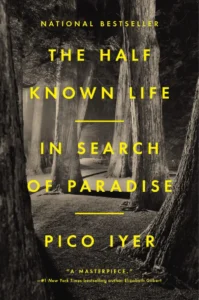In Search of the Sacred: Pico Iyer on Our Models of Paradise
INSPIRATIONAL, 23 Sep 2024
Maria Popova | The Marginalian – TRANSCEND Media Service
 “The mind is its own place, and in it self can make a Heav’n of Hell, a Hell of Heav’n,” Milton wrote in his immortal Paradise Lost. With these human minds, arising from these material bodies, we keep trying to find heaven — to make heaven — in our myths and our mundanities, right here in the place where we are: in this beautiful and troubled world. We give it different names — eden, paradise, nirvana, poetry — but it springs from the selfsame longing: to dwell in beauty and freedom from suffering.
“The mind is its own place, and in it self can make a Heav’n of Hell, a Hell of Heav’n,” Milton wrote in his immortal Paradise Lost. With these human minds, arising from these material bodies, we keep trying to find heaven — to make heaven — in our myths and our mundanities, right here in the place where we are: in this beautiful and troubled world. We give it different names — eden, paradise, nirvana, poetry — but it springs from the selfsame longing: to dwell in beauty and freedom from suffering.
With soulful curiosity channeled in his ever-lyrical prose, Pico Iyer chronicles a lifetime of pilgrimages to some of Earth’s greatest shrines to that longing in The Half Known Life: In Search of Paradise (public library).
He begins in Iran, replete with monuments to Omar Khayyām, who built “a paradise of words” with his poems while revolutionizing astronomy — a place of uncommon beauty and uncommon terror, with roots as deep as the history of the written word, and living branches as tangled as the most contradictory impulses of human nature:
After years of travel, I’d begun to wonder what kind of paradise can ever be found in a world of unceasing conflict — and whether the very search for it might not simply aggravate our differences. And the natural place to embark upon such an inquiry — should we discard the notion of heaven entirely? — seemed to be the culture that had given us both our word for paradise and some of our most soulful images of it.
In Jerusalem, he walks through the Damascus Gate to find himself in “something as irreducible as life.” He visits the Himalayas and North Korea. As he travels, he is reminded of the seventeen years he spent at a Benedictine monastery in the mountains of California — an experience that forever imprinted him with the voice of inner stillness and the awareness that presence is the fundamental portal to the sacred:
Days, sometimes weeks, in the silence had given me a taste of what lies on the far side of our thoughts. Who we become — cease to become — when we put all ideas and theories behind us. I went often through pages of Thomas Merton there, but they seemed to belong to the cacophony below the stillness; the golden pampas grass in front of me, the dry hills beyond, the fleecy clouds stealing up the hillside — not what I thought about them — were the truth.
He arrives at the oceanic idyll of Sri Lanka in the lull of ceasefire after twenty years of violent fighting between the separatists and the government, not long after a deadly tsunami devastated the island. Over and over, he finds himself contemplating the interplay of beauty and brutality, in nature and human nature, reading the solution to the riddle in the still stone countenances of the statues in a local temple:
The Buddhas… stared at me impassively. Onto the quiet faces in the sun I could project anything I needed. Our one task is to make friends with reality, I could imagine them whispering — which is to say, with impermanence and suffering and death; the unrest you feel will always have more to do with you than with what’s around you. In one celebrated story, the Buddha had come upon a group of picnickers who were enraged because they’d just been robbed. “Which,” he’d famously asked, “is more important? To find the robbers or to find yourself?”
Walking through a cemetery in conflicted Kashmir, he thinks about the bygone people buried under the stone inscriptions, and about the mercy of being blind to our own fates:
I’d long been drawn to graveyards in the places where cultures cross if only because headstones put every kind of division in its place.
[…]
Few of them had probably seen what was coming: our lives can only be half known insofar as their final act, which seems to put all that has come before in place, is always hidden, and we seldom wish to think of it. We step out of the play with no chance to think back on it — and even as we’re trying to make sense of life, things are shifting, falling away from us on every side. The older I got, the more I began to feel that almost everything that had happened to me, good or bad, seemed to have come out of nowhere. As Leonard Cohen, faithful for life to the Old Testament, put it in one of his final songs, we’re “none of us deserving the cruelty or the grace.”

He visits another cemetery atop the sacred mountain three hours from his home in Japan, accompanied by the poems of Emily Dickinson — that supreme patron saint of death, who believed that “wonder is not precisely knowing and not precisely knowing not.” In consonance with poet Mark Doty’s Whitman-fomented insistence that “even in the imagined paradise of limitless eros, there must be room for death,” Iyer arrives at the deepest yearning of our paradisal pursuits while walking the ghostly cemetery, aware that in the Japanese vision of an afterlife, the transience of things — the transience of us — is “not a cause for grief so much as a summons to attention.” He reflects:
The thought that we must die, I might have heard the two hundred thousand graves saying, is the reason we must live well.
Complement The Half Known Life with Tolstoy’s vision of the afterlife and Iyer on finding beauty in impermanence and luminosity in loss, then savor this poetic meditation on how to live and how to die.
_______________________________________
 My name is Maria Popova — a reader, a wonderer, and a lover of reality who makes sense of the world and herself through the essential inner dialogue that is the act of writing. The Marginalian (which bore the unbearable name Brain Pickings for its first 15 years) is my one-woman labor of love, exploring what it means to live a decent, inspired, substantive life of purpose and gladness. Founded in 2006 as a weekly email to seven friends, eventually brought online and now included in the Library of Congress permanent web archive, it is a record of my own becoming as a person — intellectually, creatively, spiritually, poetically — drawn from my extended marginalia on the search for meaning across literature, science, art, philosophy, and the various other tendrils of human thought and feeling. A private inquiry irradiated by the ultimate question, the great quickening of wonderment that binds us all: What is all this? (More…)
My name is Maria Popova — a reader, a wonderer, and a lover of reality who makes sense of the world and herself through the essential inner dialogue that is the act of writing. The Marginalian (which bore the unbearable name Brain Pickings for its first 15 years) is my one-woman labor of love, exploring what it means to live a decent, inspired, substantive life of purpose and gladness. Founded in 2006 as a weekly email to seven friends, eventually brought online and now included in the Library of Congress permanent web archive, it is a record of my own becoming as a person — intellectually, creatively, spiritually, poetically — drawn from my extended marginalia on the search for meaning across literature, science, art, philosophy, and the various other tendrils of human thought and feeling. A private inquiry irradiated by the ultimate question, the great quickening of wonderment that binds us all: What is all this? (More…)
Go to Original – themarginalian.org
Tags: Conflict, Consciousness, God, Inspirational, Mind, Mystery, Spirituality
DISCLAIMER: The statements, views and opinions expressed in pieces republished here are solely those of the authors and do not necessarily represent those of TMS. In accordance with title 17 U.S.C. section 107, this material is distributed without profit to those who have expressed a prior interest in receiving the included information for research and educational purposes. TMS has no affiliation whatsoever with the originator of this article nor is TMS endorsed or sponsored by the originator. “GO TO ORIGINAL” links are provided as a convenience to our readers and allow for verification of authenticity. However, as originating pages are often updated by their originating host sites, the versions posted may not match the versions our readers view when clicking the “GO TO ORIGINAL” links. This site contains copyrighted material the use of which has not always been specifically authorized by the copyright owner. We are making such material available in our efforts to advance understanding of environmental, political, human rights, economic, democracy, scientific, and social justice issues, etc. We believe this constitutes a ‘fair use’ of any such copyrighted material as provided for in section 107 of the US Copyright Law. In accordance with Title 17 U.S.C. Section 107, the material on this site is distributed without profit to those who have expressed a prior interest in receiving the included information for research and educational purposes. For more information go to: http://www.law.cornell.edu/uscode/17/107.shtml. If you wish to use copyrighted material from this site for purposes of your own that go beyond ‘fair use’, you must obtain permission from the copyright owner.